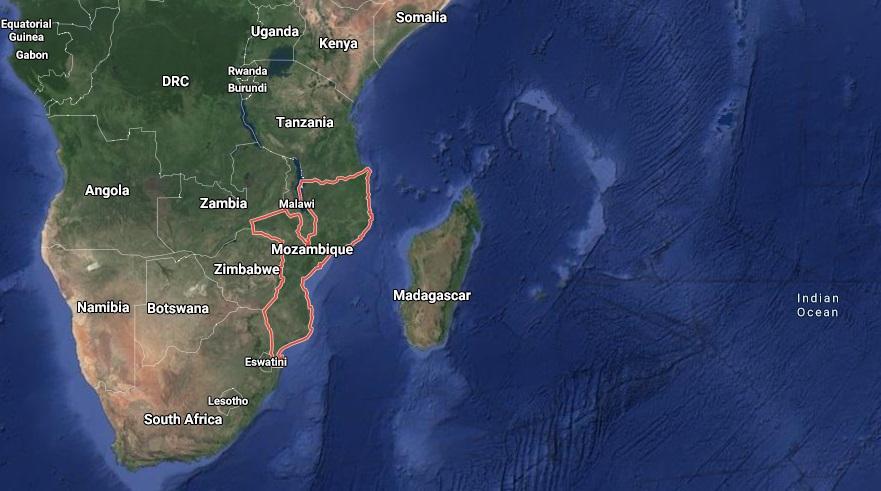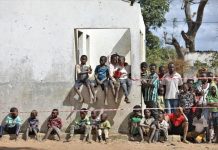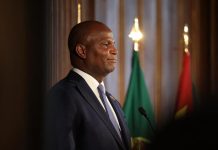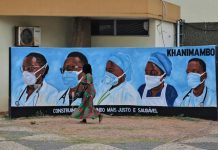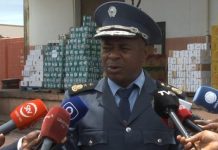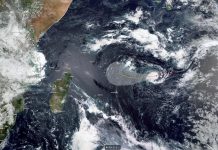Africa-Press – Mozambique. In this issue:
Cabo Delgado
Other news
The first contingent of South African soldiers flew into Pemba Monday (19 July) with Hornet lightweight armoured vehicles used by South African Special Forces. A plane from Botswana also brought troops and equipment. Rwandan troops are already in action. The arrival was confirmed by Defence Ministry spokesman Coronel Omar Saranga, who said these were preparation forces and not the full 3000-soldier SADC contingent. He added that the SADC force commander “is South African and his name is Xolani Mankayi. He is already in Mozambique.” (Daily Maverick, DefenceWeb, Radio Mocambique – 21 July; AIM 22 July)
The Zimbabwe army has put on standby
a contingent of troops to be deployed in Cabo Delgado as part of he SADC force. Military sources told NewZimbabwe.com (22 July) they received a radio communication advising them that they were now on standby and should await deployment orders. The Zimbabwean soldiers are drawn from elite fighting regiments. Zimbabwean Foreign Minister Frederick Shava reported to cabinet Tuesday (20 July) that all issues that were holding up their deployment have been ironed out, and a Status of Forces Agreement signed.
Read: Just in: South African Special Forces arrive in Mozambique
Rwandan troops which arrived in Cabo Delgado last week are based at the Total camp on the Afungi peninsula and have started patrols north and south of Palma, reports Carta de Mocambique 21 July). On Tuesday (20 July) in the forests north of Palma, near the town of Quionga, they encountered a large insurgent group and claimed to have killed 30.
The Tuesday action began following Mozambican army attempts to move all civilians in the zone to Quitunda, the village just outside the gates of what was the Total’s Afungi construction site. Quitunda was built for people displaced from the Total zone, but has become the main centre for displaced people remaining in around Palma.
On 12 and 13 July, insurgents attacked Ncumbi, a village 13 km southwest of Palma town on the road toward Mocimboa da Praia. The next day, government troops began informing civilians living in villages on the outskirts of Palma town – Ncumbi, Makongo, Olumbe, and Monjane – that they had until 19 July to relocate to Quitunda. There, government forces told civilians, they could safely await the results of a planned government/Rwandan offensive in the area. They were also barred from traveling by boat. Sea travel south toward Pemba had been one of the most popular paths of escape from the area, alongside overland treks west to Nangade. (CaboLigado 20 July)
Even Palma itself has been cleared. The new district administrator and the local police commissioner told locals at a meeting in Quitunda on 14 July that, while their offices are in Palma town, they will be staying in Quitunda until the planned offensive is over due to security concerns in Palma.
Some Rwandan troops are also based in Nangade
, Carta says. In Nangade district, displaced people arriving after walking west from Palma reported that a Mozambican military unit executed 15 suspected insurgents that had been captured attempting to cross the Rovuma River into Tanzania on 13 July. On 17 July, insurgents attacked Mitope, a village in northwest Mocimboa da Praia district along the border with Nangade. (CaboLigado 20 July)
The Rwandan commander is known for persecuting and murdering opponents of Paul Kagame abroad,
reports Carta de Mocambique (19 July). The fearsome Major General Innocent Kabandana was in the USA for five years, and Carta claims he was responsible for the elimination of several Rwandan citizens. The Rwandan newspaper Jambo News also reports that in the 1990s, Kabandana was responsible for the murder of three bishops and nine priests in the DRC and Burundi. Two Rwandan dissidents have been murdered in Mozambique, and others in South Africa. It appears that the handing over to Rwanda in May of dissident refugee journalist Ntamuhanga Cassien was a condition for sending in Rwandan troops.
And it has been revealed this week by a global media investigation that Rwanda is one of only two African countries to be using Pegasus spyware from the Israeli NSO group. The extremely powerful hacking software not only reads everything on a mobile telephone, but also turns the phone into a surveillance device – all without the user ever knowing. The media consortium and Amnesty gained a list of phone numbers that Pegasus users were targeting. Rwanda’s targets included President Cyril Ramaphosa. Researchers identified a sample of the phones, and half had been attacked with Pegasus. So Rwandan troops definitely come as part of a package including spying and attacks on opponents of Rwandan President Paul Kagame.
Mozambicans divided over Rwandan deployment,
writes Borges Nhamirre in a 19 July report for the Institute of Security Studies.
It appears that Mozambican forces are successfully creating a security cordon about 40 km east of Mueda. The first 40 km, as far as Diaca, of the road from Mueda to Mocimboa da Praia, is controlled by the government. But Awasse, just 10 km further east at a main road junction, is in insurgent hands. Insurgents attacked Diaca on 2 July and captured two police armoured personnel carriers and killed at least one member of the police, but were then driven back.
Insurgents also attacked Namacande, the Muidumbe district capital, 40 km southeast of Mueda on the road to Macomia. They claimed to have killed one soldier and seized three motorcycles, but the attack was repelled. Namacande is now largely deserted, but still held by the army as the front line against insurgent controlled zones to the east.
Macomia town remains accessible, but insurgents control the key road north, which branches to Awasse and Namacande. On 15 July, insurgents attacked the Fifth Congress village, 20 km north of Macomia town, killing six civilians. Teachers assigned to teach in Macomia district are fighting an order to return to work in the district, claiming that it is not yet safe from insurgent attacks. State employees are special targets for insurgent violence, and the teachers say they are the only civil servants being ordered back to Macomia, leaving them especially vulnerable.
Is the conflict spreading?
An incident in Nacololo, Montepuez district, outside the war zone, suggests insurgents may be trying to expand into new areas as Rwandan troops take control around Palma and Mueda. The village in northeastern Montepuez and is on the road from Montepuez to Mueda town. That road is the only open road to Mueda but has never been attacked. On 18 July a group of young people burned down at least 10 homes and stole food from local stores. Police arrested seven, including the son of a district secretary. The actions followed the pattern of insurgent attacks, and observers have been waiting for that road to be hit.
21 dead in ship sinkings.
An overloaded boat carrying four tonnes of humanitarian aid and 36 people from Pemba to Ibo sank south of Ibo; 12 people drowned. The boat left Paquitequete beach in Pemba after the 23.00 curfew, apparently to conceal that it was overloaded.
And nine women drowned when a boat loaded with refugees from Palma sank only a few kilometres south of the town, near Vamizi island, on 10 July. Four sailboats left Maganja on the Afungi peninsula just south of the Total installation, a common spot to take boats to flee Palma for the safety of Pemba. The boats were forced to quickly turn back due to foul weather, but one of the boats capsized while turning about and sank. The price of the Palma-Pemba boat trip has jumped from $25 to $40 per person, and can last 10 days, reports UNHCR.
After eight years of unsuccessful attempts to militarily defeat a range of Islamic insurgencies, France is giving up and is withdrawing most of its troops from the Sahel, President Emmanuel Macron announced on 10 June. And the reasons for the Sahel failure and similar ones in Nigeria have important lessons which point to why foreign military involvement is unlikely to defeat insurgents in Cabo Delgado.
France “refused to veer from its insistence on a military counter-insurgency strategy … despite mounting evidence that a military counter-insurgency strategy is not the answer,” explained Sahel expert Prof Jeremy Keenan in a Menas Associates webinar 21 July. “The solution lies as much with resolving the long term problems – under-development, poverty and poor governance – as it does with military muscle.” He added that “France’s branding of certain ethic groups as ‘terrorists’ and its subsequent encouragement of their traditional enemies to form auxiliary militias has been a major contributory factor” in escalating conflict and killing.
The strategy is Cabo Delgado is identical – purely military and ignoring the long term problems of under-development, poverty and poor governance. In addition, the insurgency is linked to Muslim Mwanis, and the push has been to create militias of catholic Makondes based on liberation war veterans.
Meanwhile Nigerian President Muhammadu Buhari has launched the Deep Blue Project to tackle piracy, sea robbery, and other crimes at sea in Nigerian waters and up to the Gulf of Guinea. But Freedom C. Onuoha of the University of Nigeria argues that most studies “affirm that the root of maritime insecurity in the Gulf of Guinea stems primarily from bad governance. Despite endowment with vast natural resources, most of the states parade some of the worst indices of human development. These include environmental devastation, high unemployment rates and widespread poverty generated by corruption and bad governance. I also found that unsustainable practices of oil companies have destroyed traditional farming and fishing livelihood systems in coastal communities. This has forced some people to make desperate choices. With declining opportunities for legitimate livelihood amid affluence, some young people in the region take to criminality for survival.”
That, too, sounds familiar. Past unsuccessful interventions across Africa provide the same lessons, from which Mozambique and its partners seem unwilling learn. jh
USAID opened the new “Bilibiza” Agricultural Institute on 9 July – but not in Bilibiza. It opened 130 km south, far outside the war zone – in Ocua, Chiure district, just north of the Lurio River border with Nampula province.
The choice is important because there are increasing claims that that government is consciously clearing the land of the war zone, and leaving the displaced people to be cared for by international agencies. According to the UN there are 740,000 people displaced by the war, more than the population of the war-affected area. The most recent UN access map shows that Bilibiza is only just inside the part of Quissanga district controlled by the insurgents, and there is good road access from Pemba to within a few kilometres of Bilibiza. If the Mozambican government were serious about retaking insurgent controlled area and returning people, Bilibiza would be a good place to start and rebuilding the school would have been a good focus.
Instead, USAID moved the school as far away as possible. This looks like supporting an agenda of not returning people who have fled, and keeping the land empty.
Instability in global stock markets has led to a new surge in investment in farmland in the US and Latin America. Bill Gates has become the largest private owner of US farmland (The Land Report, 11 Jan 2021). Partly this is traditional investors such as pension and hedge funds. But as a decade ago, there is a new look at African land. Again, pension and investment funds. But also countries like UAE (which has close links to Mozambique) looking for land for large scale food production – and looking for long term investments to offset falling oil and gas profits.
Think back to a decade ago when Credit Suisse and others said to President Armando Guebuza that the $2 bn secret debt would guarantee coastal protection and well as huge profits. Are the funders and fixers whispering the same thing now in the ears of the Frelimo elite – keep the land clear and when the war ends the foreign investors will take it, and you will earn huge profits? Many of those investors might be from the US and its middle east allies. jh
The number of mining licenses in Cabo Delgado is increasing, despite the war, but their owners are increasingly secret. Mwiriti Mining has the largest number of mining concessions in Cabo Delgado and was 60% owned by Raimundo Pachinuapa, independence war veteran and a member of Frelimo’s ruling Political Commission. With Gemfields it owns Mozambique Ruby Mining, one of the most profitable ruby mines in the world. But in 2020 control of Mwiriti transferred to Nairoto Resources registered in the tax haven of Mauritius, where Gemfields Mozambique is also registered. So the beneficial owner is no longer officially known.
A detailed study by CIP (Public Integrity Centre) published 20 July shows that “a good portion of the concessions” is owned by Mozambique’s political elite – influential people in Frelimo or their families. Political Commission member Margarida Talapa owns 88% of Lurio Ruby Mining. Two members of the family of liberation war commander and Political Commission member Alberto Chipande have mining concessions, Basília Miguel Chipande (Atalaia Ruby Mining) and Nkutema Namoto Alberto Chipande (Mavanda Minerals). The son of former president Joaquim Chissano, N’naite Joaquim Chissano, controls granite miner CMS (Consolidated Mining Services).
Mozambique is a member of the Extractive Industries Transparency Initiative (EITI), which requires the beneficial owners of mineral resources to be identified. But Mozambique has not done so in its past two annual reports to EITI. Mozambican law has no such requirement and most Cabo Delgado mines are now controlled either by Mauritius companies or by Mozambican public limited companies (sociedade anonima) which do not publish ownership lists. Thus the Frelimo elite is hiding its ownership of Cabo Delgado resources.
The CIP report is “Mining Concession requests increase as armed conflict in Cabo Delgado intensifies: Who are the lords of the mining licenses in Cabo Delgado?” by Rui Mate (in English). CIP has posted a detailed list of the 113 mining concessions in Cabo Delgado.
The official mining register is particularly easy to use and shows that almost the entire province is allocated for mining (blue), gas and oil, or national parks (green) – leaving little available farmland.
Other news
Four spies from South Africa’s State Security Agency (SSA) were caught spying on the Cabo Delgado war. The spooks were caught and left stranded for nine days in Maputo, reported City Press (4 July). The four operatives had their passports and equipment, including drones, confiscated in Maputo, and lost contact with the SSA. Their whereabouts were only known after one managed to establish contact with the agency. News24 (9 July) reports that the Mozambican security service SISE shot down one of the South Africa drones.
(This is not a new event. In 1983 Mozambique shot down an apartheid South African drone over Maputo and displayed it to the press – this was the first time most of us had seen a drone or what was then called an RPV, “remotely piloted vehicle”.)
The spy incident happened in March or April, and it is believed that one of the visits to Maputo by Security Minister Ayanda Dlodlo and President Cyril Ramaphosa was in part in negotiate the release of the spies. The undercover mission was organised by SSA international operations head Robert McBride, apparently without higher approval in South Africa or agreement with Maputo, and he was suspended on 9 July. The incident happened when South Africa was pushing for SADC intervention in Cabo Delgado, and my have added to Mozambique’s opposition to the proposal.
Detention of spies: Are Maputo-Pretoria relations deteriorating? – DW
Dlodlo had only appointed McBride a year ago, in July 2020. He was appointed in part to bring stability to the deeply divided SSA. At the time News24 (17 July 2020) reported that “insiders said McBride’s key job was to clean up the agency of rogue elements” (see below). During the apartheid era, McBride was a senior member of Umkhonto we Sizwe, the armed wing of the ANC.
As in Mozambique and eSwatini, the violence is based in discontent about poverty, joblessness, and lack of voice and future. The trigger was the jailing of Jacob Zuma, who claimed to speak for the poor. When President Cyril Ramaphosa said that the violence was pre-planned, it was dismissed by many as claiming conspiracies. However, journalists have investigated, and it is true. Major work was done by Ferial Haffajee in the Daily Maverick (14 July) in an article “Under investigation: Twelve masterminds planned and executed insurrection on social media, then lost control after looting spree.” And that was enough to convince the BBC (17 July)
Zuma was head of the ANC in Mozambique for a decade – 1977-87 – and he then moved to the ANC Head Office in Lusaka as Chief of Intelligence. As spymaster, he built his personal network, which he continued to fund in the corruption era when he was President. During his years in power, parallel intelligence structures were set up, in effect doing the President’s bidding. This was confirmed by 2018 Report of the High-Level Review Panel on the SSA. It is now believed that the uprising was well organised by Zuma’s security allies, with attacks on trucks and looting, building on existing discontent.
Dates have been set for two trials in the long running $2 bn secret debt saga. The Mozambique case will start on 23 August, but the London case has been deferred to next year.
In Mozambique the trial of 19 people accused of crimes in relation to the scandal has been set for 23 August (Mediafax 21 July). The trial will be televised and former President Armando Guebuza will give evidence on 6 October. (Canal de Mocambique, Carta de Mocambique 21 July) The full calendar of witnesses and dates is available HERE.
Most are of the 19 defendants are now released on bail, but five remain in detention in Lingamo prison in Matola; they include Ndambi Guebuza, the oldest son of former President Guebuza; the former head of the State Intelligence and Security Service (SISE), Gregorio Leao; and the head of SISE economic intelligence, Antonio do Rosario, who became chairperson of all three fraudulent companies.
Ex Finance Minister Manuel Chang, who signed illegal loan guarantees, has been in a South African prison for two-and-a-half years awaiting the decision of South African Justice Minister, Ronald Lamola as to whether he should be extradited to Mozambique or to the United States. According to US prosecutors investigating the case, Chang received bribes from Privinvest.
Meanwhile in the London High Court, Mr Justice Robin Knowles ruled on 21 July that several secret debt cases should be combined into a single hearing next year:
By
Joseph Hanlon

